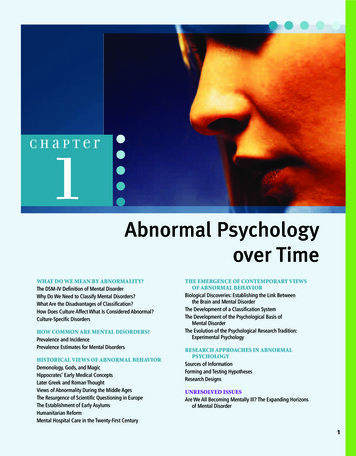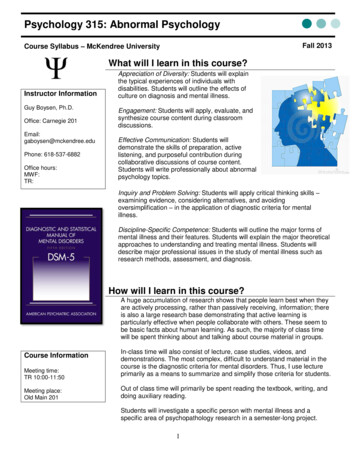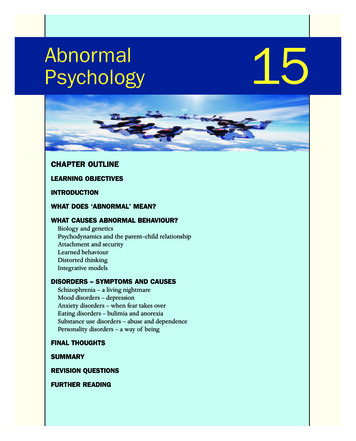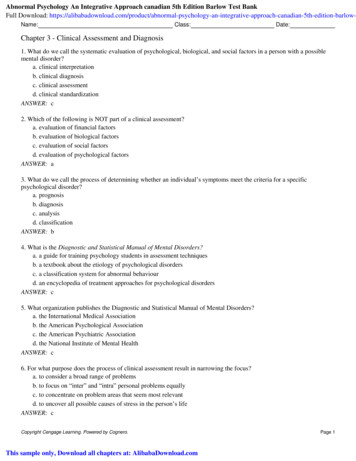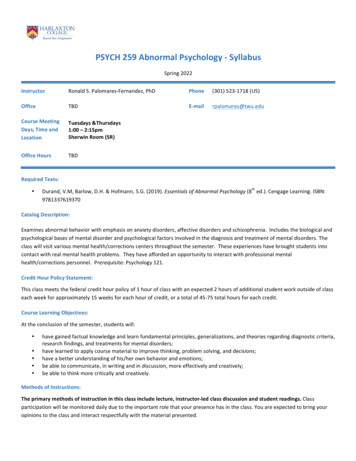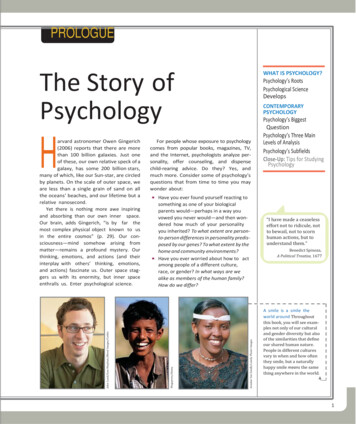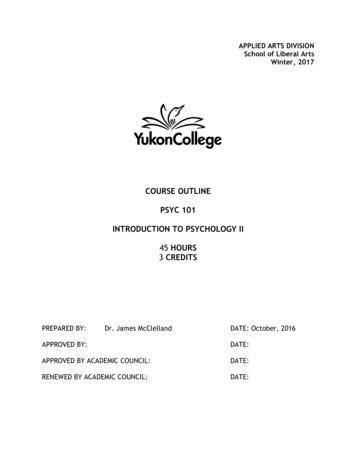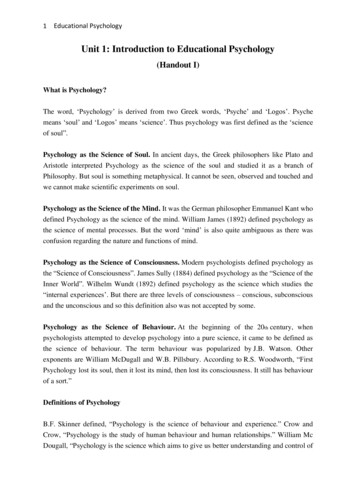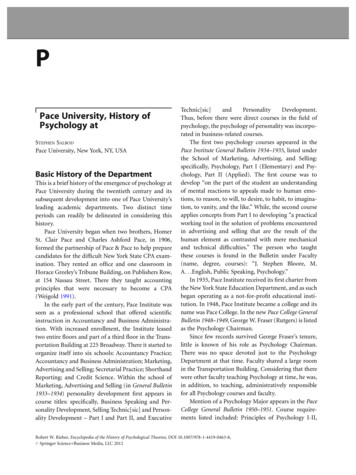
Transcription
Faculty of ScienceSchool of PsychologyGENS9003/PSYC1023Abnormal PsychologySemester 2, 2014Table of Contents1.Information about the Course . 22.Staff Contact Details . 23.Course Timetable. 24.Aims of the Course . 25.Student Learning Outcomes . 36.Graduate Attributes. 37.Rationale for the Inclusion of Content and Teaching Approach. 48.Teaching Strategies . 49.Course Schedule . 510. Assessment . 611. Expected Resources for Students . 712. Course Evaluation & Development . 713. Plagiarism & Academic Integrity. 714. Administrative Matters . 9
1. Information about the CourseFACULTYSCHOOL OR DEPARTMENTCOURSE CODECOURSE NAMESEMESTERUNITS OF CREDITASSUMED KNOWLEDGE,PREREQUISITES OR COREQUISITESSUMMARY OF THE COURSESciencePsychologyGENS9003 / PSYC1023Abnormal PsychologySemester 26YEARLEVEL OF COURSE2014GENERAL / 1NoneThis course will provide a contemporary view of issues associated with humanmental disorders and psychopathology; it will introduce and discuss the notionof abnormality in behaviour, diagnostic practice, stigma, prognosis andtreatment in human mental disorders. There will be discussion of what isknown of the nature and aetiology of major mental disorders such asschizophrenia and depression, psychological and biological theories thatattempt to account for these disorders, as well as their prevalence, treatmentand prognosis.2. Staff Contact DetailsCOURSE COORDINATORNameMarios Mat 436Contact Time &AvailabilityMon-Fri (Email toarrange meeting)Preferred contact viaemailLECTURERSNameDr. Joshua BroderickMarios PanayiPhoneN/AEmailN/AOfficeN/AContact Time &AvailabilityAll questions regardingthe course contentshould be directed toMarios Panayi.3. Course TimetableComponentLectureClass Number1176DayMon (made available)Time09:00LocationOnline; MoodleNB. Course timetables are subject to change without notice. Students are advised to check regularly forupdates on the Moodle course site.4. Aims of the CourseThe course is an introduction to the study of maladaptive behaviour and mental disorders.The aims of the course are to provide you with:1. This course will provide a contemporary view of issues associated with human mental disorders andpsychopathology.2. It will introduce and discuss the notion of abnormality in behaviour, diagnostic practice, stigma,prognosis and treatment in human mental disorders.3. There will be discussion of what is known of the nature and aetiology of major mental disorders suchas eating disorders, child psychopathology, anxiety disorders, depression, and others.4. Psychological and biological theories that attempt to account for these disorders.2
5. Student Learning OutcomesBy the end of this course you will be able to:1. You will be able to demonstrate knowledge of general issues relating to the classification and causation ofmental disorders and key related concepts (e.g. nature vs. nurture).2. You will learn the characteristics of the basic scientific method and how it is applied in psychological researchcontexts – particularly with regard to mental health and be able to demonstrate that knowledge.3. You will be able to demonstrate the major features of the specific disorders covered within the course, andbe able to outline some of the major theorised causal and maintaining features of them.4. You will be able to demonstrate knowledge of some of the medical and psychological treatments for thespecific disorders discussed.5. You will be able to demonstrate the skills of critical thinking, conceptual analysis, and written and visualexpression.6. Graduate AttributesSchool of PsychologyGraduate Attributes*Level of Focus0 No focus1 Minimal2 Minor3 Major1. Core knowledge andunderstanding32. Research methods inpsychology13. Critical thinking skills24. Values, research andprofessional ethics1*Activities/AssessmentParticipation in online lectures and prescribed chapterreadings. These activities are designed to enhance yourunderstanding of abnormal psychology – includingunderstanding the key characteristics of specific mentaldisorders, scientifically driven theoretical explanations forthese mental disorders, and evidence based treatments.Specific discussions outlining the process of scientific enquiryin general and more specifically with relation to psychologyand abnormal psychology. Ongoing delivery of case examplesof scientific research in the field of abnormal psychologythroughout lectures and in the textbook.The selected assessments for this course will allow you toemploy your critical thinking skills to a choice of topicsrelating to the science of abnormal psychology. You will alsobe encouraged to think critically about scientific issues duringonline lectures; using the online chat forum; and in forumdiscussions.There will be scope for discussion within lectures andtextbook material of the ethical issues surrounding the studyand treatment of mental disorders – with a focusedconsideration of individual, societal and cross culturalcontexts.You will be asked to consider the stigma associated withmental disorders; and to consider solutions at an individualand societal level to overcoming such prejudice.The Graduate Attributes of the Australian Undergraduate Psychology Program was produced as part of the CarrickAssociate Fellowship project, “Sustainable and evidence-based learning and teaching approaches to the undergraduatepsychology curriculum”, and “Designing a diverse and future-oriented vision for undergraduate psychology in Australia”, aDiscipline-based Initiative funded by the Carrick Institute for Learning and Teaching in Higher Education (see Appendix II),and supported by the Australian Psychological Society, and the University of New South Wales (School of Psychology;Learning and Teaching @UNSW).
5. Communication skills36. Learning and applicationof psychology2Participating in the online discussion forum. Production ofonline source content. Your ability to effectivelycommunicate your ideas will also be specifically assessed in along answer or essay format assignment.You will be required to exhibit a considered application ofseveral of the key concepts and theoretical models within thecontext of psychology and more specifically abnormalpsychology when completing assessments.7. Rationale for the Inclusion of Content and Teaching Approach All teaching strategies are designed to educate students on the learning outcomes and graduateattributes outlined in the above sections (4, 5, and 6)-The lecture material is intended to provide you with the majority of information required to gain an indepth knowledge of abnormal psychology – not only of specific disorders, but also of the scientificprocesses utilised in the study of them-The prescribed textbook also provides a source of important learning information relevant toabnormal psychology. The textbook content is required reading for this course and seeks tosupplement the lecture material.-The assignment content will provide you with an opportunity to consolidate your learning of coursematerial and to demonstrate independent research and analytical skills-The examination (quizzes) will provide you with an opportunity to test your understanding of coursematerial8. Teaching StrategiesThe course is taught entirely online using the e-learning Moodle site [https://student.unsw.edu.au/moodle].There will be an online examination and a long answer or essay format assignment which is to be submittedonline.There will be a final examination that will be held on-site (at the Kensington Campus).No external examinations are permitted – unless otherwise agreed with the course co-ordinator.
9. Course ScheduleOnline Lectures***Note all lectures will be delivered online******There are approximately 2-4 modules for each lecture topicrunning for approximately 10-30 minutes each.***1WeekStarting28/07/2014Online Delivery1.2.Course IntroductionHistory of Abnormal Psychology25/08/2014 3.4.Definitions of Abnormal BehaviourDSM and Classification311/08/2014 201412.15/09/201413.The Scientific MethodTechnology and Abnormal Psychology Research45678922/09/2014Emotion (6)*Fear, Anxiety and Conditioning (6)Anxiety Disorders (I) (9)Anxiety Disorders (II) (9)Mood Disorders (10)Schizophrenia (10)Personality Disorders (12)14. Drug Addiction (12)***Mid Semester Break***107/10/2014 15. Child Psychopathology (8)a. Chapter 141113/10/2014 16. Sleep Disorders (6)17. Cognitive Disorders (6)1220/10/2014 18. Eating Disorders (6)19. New Directions in Treatment (6)1327/10/2014 20. Course Summary and Exam Information*Numbers in parentheses indicate the number of questions in the final exam from this topic
10. AssessmentAssessment TaskMid-Session ExamAssignmentFinal uateAttributesAssessed1-4,61-51-61-51-4,6Date ofFeedbackReleaseSubmissionWho25/08/20149 a.m.30/08/2014;Midnight20/10/2014;5 ne)(online)ExamPeriod1. Assignment – 35%- A written assignment will be required for submission in the second final Week 12 (Monday 20/10/2014; 5 p.m.). You will be required to produce a researched writtenpiece to be submitted online.2. Mid-session exam – 15%- At the beginning of Week 5 (beginning Monday 25/08/2014; 9 a.m.), a 20 question multiple-choice test will be made available online for approximately one week (theexam will be available until Saturday 30/08/2014; Midnight). Students will be able to sit the examination once. The exam will last 15 mins allowing for 45s per question.Details about the delivery of the online quiz will be made available to students via Moodle and email. Please ensure that you check both of these sources often (i.e. daily orat least bi-weekly). The material assessed in this exam will cover all material presented in weeks, 2, 3, & 4, including textbook material.- Note that this mid-session exam will allow you to assess your progress in the course prior to the semester 2 cut-off date to drop the course without financial liability(Sunday, 31/08/2014) and without academic penalty (Sunday, 14/09/2014). For more information regarding these dates check MyUNSW.3. Final exam – 50%- There will be a 2-hour examination held during the University examination period.- The examination will include a large number of multiple choice questions covering lecture material from Weeks 1-13. See section “9. Course Schedule” for thedistribution of questions from each topic.- No student should organise travel during this period until the final examination schedule has been released and the date of the exam is known.- Although this course is delivered online, it is a university requirement that enrolled students be within the country whilst completing coursework and examinations.6
11. Expected Resources for StudentsTEXTBOOKSCOURSE MANUALREQUIRED READINGSRECOMMENDED INTERNETSITESRequired Reading: Barlow, D.H., & Durand V. M. (2015). Abnormal psychology:An integrative approach. 7th edition. Thomson Learning.-Available from the UNSW bookshop in 2 formats: eBook and physical textAvailable at course websiteAvailable from university bookshop and library (both general and high volumeuse sections)You should be aware of policies regarding your behaviour at the university.Familiarize yourself with the following:Student Code of ConductPolicy concerning academic honestyEmail policyUNSW Anti-racism policy statementUNSW Equity and Diversity policy statementUNSW Equal opportunity in education policy statement12. Course Evaluation & DevelopmentCourses are periodically reviewed and students’ feedback is used to improve them. Feedback is gathered usingvarious means including UNSW’s Course and Teaching Evaluation and Improvement (CATEI) process.13. Plagiarism & Academic IntegrityWhat is plagiarism?Plagiarism is presenting someone else’s thoughts or work as your own. It can take many forms, from nothaving appropriate academic referencing to deliberate cheating.UNSW groups plagiarism into the following categories: Copying: using the same or very similar words to the original text or idea without acknowledging thesource or using quotation marks. This also applies to images, art and design projects, as well aspresentations where someone presents another’s ideas or words without credit. Inappropriate paraphrasing: changing a few words and phrases while mostly retaining the originalstructure and information without acknowledgement. This also applies in presentations where someoneparaphrases another’s ideas or words without credit. It also applies to piecing together quotes andparaphrases into a new whole, without referencing and a student’s own analysis to bring the materialtogether. Collusion: working with others but passing off the work as a person’s individual work. Collusion alsoincludes providing your work to another student before the due date, or for the purpose of themplagiarising at any time, paying another person to perform an academic task, stealing or acquiring anotherperson’s academic work and copying it, offering to complete another person’s work or seeking paymentfor completing academic work. Duplication: submitting your own work, in whole or in part, where it has previously been prepared orsubmitted for another assessment or course at UNSW or another university.Where can I find out more information?In many cases plagiarism is the result of inexperience about academic conventions. The University hasresources and information to assist you to avoid plagiarism. The first place you can look is the section aboutreferencing and plagiarism in each Course Guide, as this will also include information specific to the disciplinethe course is from. There are also other sources of assistance at UNSW: How can the Learning Centre help me?The Learning Centre assists students with understanding academic integrity and how to not plagiarise.Information is available on their website: www.lc.unsw.edu.au/plagiarism. They also hold workshops andcan help students one-on-one. How can Elise help me?ELISE (Enabling Library & Information Skills for Everyone) is an online tutorial to help you understand how7
to find and use information for your assignments or research. It will help you to search databases, identifygood quality information and write assignments. It will also help you understand plagiarism and how toavoid it. All undergraduate students have to review the ELISE tutorial in their first semester and completethe quiz, but any student can review it to improve their knowledge: http://elise.library.unsw.edu.au. What is Turnitin?Turnitin is a checking database which reviews your work and compares it to an international collection ofbooks, journals, Internet pages and other student’s assignments. The database checks referencing andwhether you have copied something from another student, resource, or off the Internet. Sometimesstudents submit their work into Turnitin when they hand it in, but academics can also use it to check astudent’s work when they are marking it. You can find out more about Turnitin here:http://telt.unsw.edu.au/turnitin.What if plagiarism is found in my work?If plagiarism is found in your work when you are in first year, your lecturer will offer you assistance to improveyour academic skills. They may ask you to look at some online resources, attend the Learning Centre, orsometimes resubmit your work with the problem fixed. However more serious instances in first year, such asstealing another student’s work or paying someone to do your work, may be investigated under the StudentMisconduct Procedures.Repeated plagiarism (even in first year), plagiarism after first year, or serious instances, may also beinvestigated under the Student Misconduct Procedures. The penalties under the procedures can include areduction in marks, failing a course or for the most serious matters (like plagiarism in a honours thesis) evensuspension from the university. The Student Misconduct Procedures are available fExamples of plagiarismUsing the internet appropriatelyA first year student handed in an assignment where she had copied from a website. Her lecturer realised shedidn’t understand you have to reference websites in the same way you reference books and journal articles.The lecturer explained how to reference and sent her to a workshop at the Learning Centre to help herimprove her skills.Working together on a math assignmentA group of Mathematics students worked together on an assignment when they had been told this was notallowed. All questions where the students had worked together were given zero, and this lead to some studentfailing the assessment.No referencing in an assessmentA third year student submitted a major assessment that included material from a journal article published inCanada. When his essay was submitted into Turnitin, it let the academic know that the student didn’treference the material. The student was given zero for the essay, and because it was worth 50 per cent hefailed the course.Copying design workA final year design student used images of someone else’s designs in her work and he said the designs were hisown. The matter was formally investigated by his Faculty and he was found to have committed academicmisconduct and failed the course.Further information and assistanceIf you would like further information or assistance with avoiding plagiarism, you can contact the LearningCentre. The Learning Centre at The University of New South Wales has two locations:UNSW Learning CentreLower Ground Floor, North Wing, Chancellery Building(C22 Kensington Campus – near Student Central)www.lc.unsw.edu.auPhone: 9385 2060
Email: learningcentre@unsw.edu.auOpening Hours:Monday to Thursday: 9am - 5pm andFriday: 9am - 2.30pmCOFA Campus Learning CentreEmail: cofalearningcentre@unsw.edu.auPhone: 9385 073914. Administrative link file attachment/Psychology Student Guide 2014.pdf ,contains School policies and procedures relevant for all students enrolled in undergraduate or Masterspsychology courses, such as: Attendance requirements;Assignment submissions and returns;Assessments;Special consideration in the event of illness or misadventure;Student Code of Conduct;Student complaints and grievances;Student Equity and Disability Unit; andOccupational Health & Safety.Students should familiarise themselves with the information contained in this Guide.
psychology 1 Specific discussions outlining the process of scientific enquiry in general and more specifically with relation to psychology and abnormal psychology. Ongoing delivery of case examples of scientific research in the field of abnormal psychology throughout lectures and in the
